Hussam al-Mahmoud | Jana al-Issa
In light of a state of uncertainty and a constant suspicion that Russia might obstruct the extension resolution through the Security Council, Syrians in the northwestern region face every six months deep fears about the possibility of not renewing the UN mandate of cross-border aid deliveries through the Bab al-Hawa border crossing, which is considered the “lifeline” for the millions of local residents and displaced people.
These justified fears, based on the depth of need and the fragility of the living and economic situation, were reinforced this time and justified by Russia’s use of its veto in front of a Swiss-Brazilian draft resolution, which called for extending the mandate of aid deliveries for 12 months from the Bab al-Hawa border crossing with Turkey, based on the calls and appeals of international organizations concerned with the humanitarian sector.
The Swiss-Brazilian draft was aborted by Moscow, at the same time announcing a draft resolution allowing the entry of aid through the same crossing for six months only while threatening to stop the mechanism unless the Russian project was supported by the Security Council, which ended the session in disagreement of points of view, for which the people of northwestern Syria, pay the price.
In this file, Enab Baladi discusses the Russian position on the aid delivery mechanism and the regime’s attempt to extract the file from the Security Council. It also tries to explain, with scholars and specialists, the possible impacts on the humanitarian and relief situation in a region burdened by needs, based on the UN figures.
Syrian regime requests “full coordination,” “Checkmate” by Moscow
On July 13, less than 48 hours after the Security Council session that discussed passing aid across the border, on the 11th of the same month, the Syrian regime informed the Secretary-General of the United Nations in a letter written by the regime’s representative to the organization, Bassam Sabbagh, of its “sovereign” decision stating the “United Nations could use a border crossing from Turkey to continue delivering aid to northwest Syria for another six months.”
According to Reuters, Sabbagh’s letter, seen by Enab Baladi, “The U.N. aid deliveries would have to be in full cooperation and coordination with the Syrian government.”
Andrew Tabler, former director of the Syria file at the US National Security Council and fellow at the Washington Institute for Near East Policy, considered that the Syrian regime’s proposal gives al-Assad and Putin a stranglehold on Syrian civilians who have suffered 12 years of war and displacement.
He also described the regime’s move as a “checkmate from Moscow” and a blow to Western policy towards Syria, according to The New York Times.
This step came after the failure of the Security Council on July 11 to extend the UN mandate of the mechanism. What happened was that the Swiss-Brazilian draft resolution, despite its last minute amendment and the demand for an extension for nine months and not a full year, as was previously required, collided with the Russian refusal, which thwarted the adoption of the resolution, despite obtaining the support of 13 members (out of 15), and China’s abstention from voting, but the Russian refusal aborted the project.
After putting forward the Russian draft resolution, which provides for an extension of only six months, the result of the vote came in favor of two members, three objections, and ten abstentions, which led to the non-adoption of the resolution as well.
The Russian refusal, which came in line with the will of the Syrian regime, seemed to conflict with the Arab efforts for a solution that have topped the scene recently through the Jordanian initiative portal, led by the humanitarian file and the issue of needs, with a clear and explicit affirmation of the need to seriously deal with the aid delivery.
The initiative calls for Damascus to grant international bodies and organizations the right to access areas under the control of the regime, to facilitate the arrival of aid in various ways (cross borders and across lines), and to come up with a mechanism that allows ensuring that donor aid reaches its final destinations.
At the same time, the Jordanian initiative offers the Syrian regime to invest in early recovery projects, within the sectors of water, health, education, housing, and sanitation, in various Syrian regions.
The joint ministerial meeting of the strategic dialogue between the Gulf Cooperation Council states and Russia, which was held in its sixth session on July 10, produced an affirmation of the importance of unhindered humanitarian access to all Syrians in need across the country and called on the international community, the United Nations and its humanitarian agencies to increase their aid to Syria, in order to improve the humanitarian situation.
The joint final statement, issued by the parties meeting in the Russian capital, Moscow, urged the Syrian regime to adhere to the Jordanian initiative and to start taking the necessary steps to reach a comprehensive solution to the crisis.
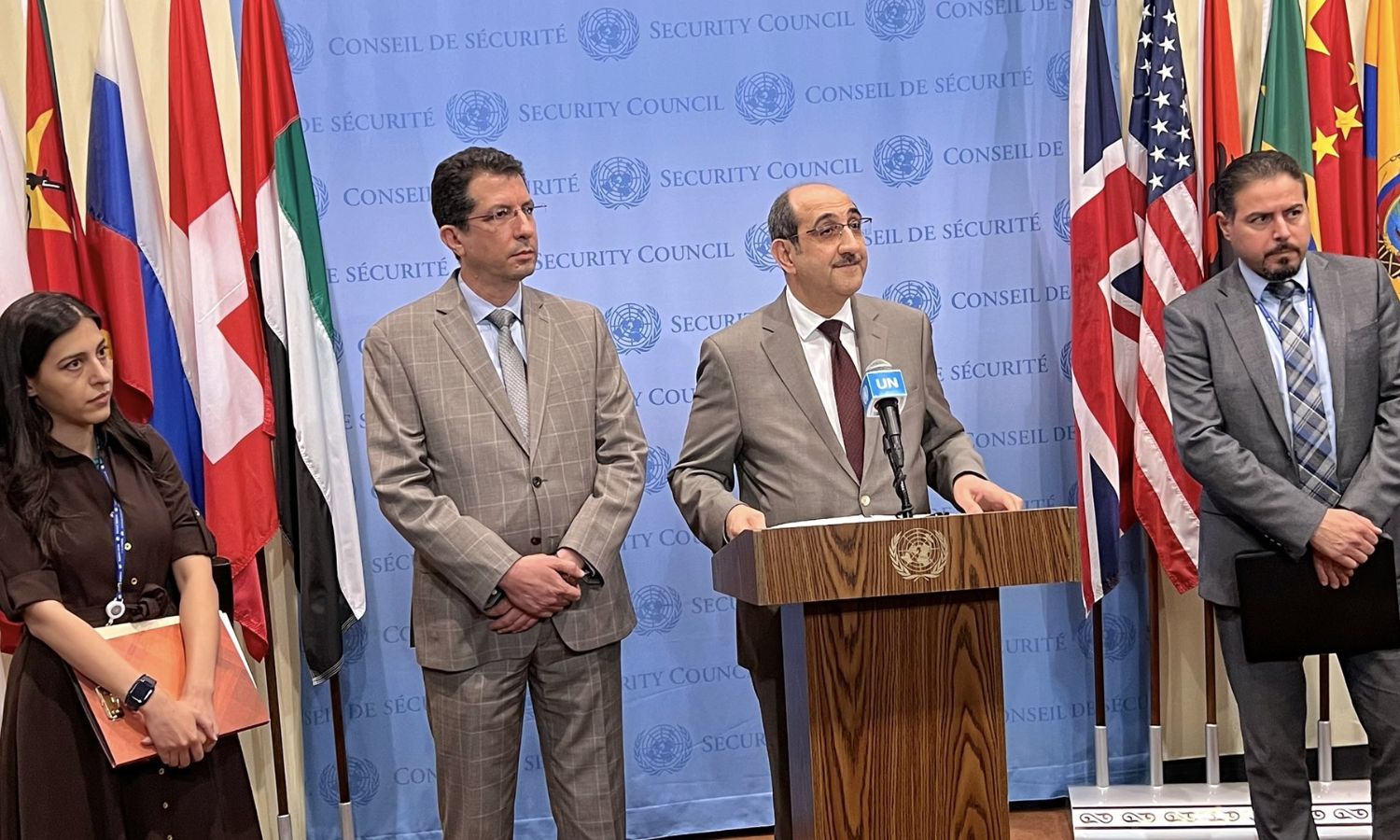
The regime’s Representative to the United Nations, Bassam Sabbagh, during a press conference after the failure to renew the UN mandate for cross-border aid – July 13 (Twitter/Bassam Sabbagh)
Security Council is indispensable
After the position presented by the regime regarding “full cooperation and coordination” and allowing the entry of aid through Bab al-Hawa crossing, the United Nations described the Syrian regime’s conditions for using Bab al-Hawa as “unacceptable.”
In a note to the Security Council, seen by Reuters, the U.N. Office for the Coordination of Humanitarian Affairs (OCHA) took issue with “two unacceptable conditions” in the letter sent by Syria on July 14 outlining its approval of the U.N. operation, according to Reuters.
The Syrian regime gave its approval for the U.N. to use Bab al-Hawa for another six months but with several conditions.
“First, the Syrian government has stressed that the United Nations should not communicate with entities designated as ‘terrorist,’” OCHA wrote. “The United Nations and its implementing partners must continue to engage with relevant state and non-state parties as operationally necessary.”
After the message sent by the Syrian delegate, the German special envoy to Syria, Stefan Schneck, said on July 14 that there is a need to pass a Security Council resolution, as the letter indicates that the delivery of United Nations aid must be “in full cooperation and coordination with the Syrian government.”
In the same context, Emma Beals, a Syria analyst and nonresident fellow at the Middle East Institute, said, “A UN Security Council resolution is still needed to ensure continued humanitarian access,” according to Al-Monitor website.
Beals added, “Given the regime’s history of aid denial as a military strategy for the entirety of Syria’s more than 12-year war, it is simply untenable to manage aid into the northwest through regime consent.”
Not promising signs
Moscow adhered to its position, and the state of disagreement in the July 11 session was preceded by indications that did not suggest a smooth passage of the decision.
On July 9, the pro-regime al-Watan newspaper considered that the Russian draft resolution comes in opposition to the Swiss-Brazilian, which Moscow rejects, and considers it “a violation of the sovereignty of the Syrian state, which is capable of cross-border aid deliveries to all regions of the country.”
At the same time, the Syrian Response Coordination Group (SRCG) counted the entry of ten trucks in one batch during the decision period (six months), while the number of trucks that entered across the border during the same period reached 4,342 trucks, including 602 trucks from the Bab al-Salama and al-Rai crossings, according to the exemption in force, as a result of the earthquake (the expiration of the exemption is on August 13, after it was extended in May for three months).
The voting session was also postponed more than once before it took place on July 11, as AFP reported on the same day (before the session) that the permanent members of the Security Council have been trying for days to reach an understanding about the UN mechanism for aid entry and that the vote was postponed from July 7 to 10, and then to the 11th of the same month.
What does the regime want?
When the Syrian regime informed the United Nations of its approval of the entry of aid through Bab al-Hawa in “cooperation and coordination” with its government, it attributed this step to what it described as the “intransigence” of some countries in the UN Security Council, and their “refusal to make improvements to the draft resolution to extend Security Council Resolution (2672)”, which was submitted by Brazil and Switzerland, and the rejection of the Russian draft resolution, which led to the expiration of the UN resolution to extend the mechanism for cross-border aid deliveries.
The political analyst on Russian affairs, Nasr al-Youssef, explained to Enab Baladi that the position of the Syrian regime fully corresponds to what the Russians wanted, i.e., an extension as it was in the past only, to put the opponents of the Russian draft resolution in front of searching for the significance of going to the United Nations and searching for solutions outside the Russian veto, if the regime allows the transit of aid through the Bab al-Hawa crossing.
Al-Youssef indicated that the Russian veto would transfer the file to the United Nations General Assembly, which is supposed to meet within ten days to discuss the circumstances of Russia’s use of its veto against the Swiss-Brazilian draft resolution, which makes the regime’s step a preemption of a possible discussion in the United Nations on the issue of aid, and the issuance of a decision that may not be in line with the aspirations of the regime regarding the file as a whole.
For his part, Maan Talaa, a researcher at the Omran Center for Strategic Studies, considered that crisis management presupposes domination of the Russian position in the Syrian file and American performance at a low cost.
In addition, the tools of the game in the Syrian file have become confined to the humanitarian side, especially after the disruption in the political track and the work of the Syrian Constitutional Committee (SCC), and after the military battles stopped, and understandings were reached about the impossibility of returning to the situation before 2018, the researcher adds.
Talaa told Enab Baladi that the aid file began with paths that were apparently studied by the Russians. It started in an open manner before the need to renew it periodically. Then, renewal required a new resolution, which means returning to the Security Council every six months and conducting negotiating policies to reach an appropriate formula.
The most prominent title of this issue is political blackmail from a humanitarian perspective.
According to the researcher, the idea of humanitarian aid does not presuppose the approval of the regime, and this detracts from what he considers “state sovereignty.”
Both draft resolutions were presented and met with mutual rejection in the Security Council, resulting in a compromise later. What happened was that the compromise failed in this case, which prompted the Syrian regime to try to exploit the obstruction in order to restore its “sovereignty” in this file.
The idea is political, in which the regime tries to achieve more “legitimacy” after previous steps through which it tried to strengthen what it considers its “legitimacy,” whether through the February 6 earthquake and the direct international engagement that accompanied it or the Arab normalization that created a “new political space” for it, according to Talaa.
What the regime hopes practically is to remove the file completely from the Security Council and to force countries, through the United Nations and in direct dialogue with Damascus, to involve the regime in humanitarian support policies.
Thus, the regime seeks greater control over financing and distribution, but the researcher ruled out that the international community would quickly go to deal with the regime, as a return to negotiation is possible, and perhaps unilateral dealing with the de facto forces on the ground in this regard, given that the regime does not control the Syrian borders as a whole.
|
The political freeze in Syria has produced administrative borders that built its ruling patterns on security borders and highlighted the presence of actors below the state, and thus dealing with the idea of decentralization as a fait accompli may lead to dealing with the de facto authorities in the decentralizations formed on the ground. Maan Talaa – A fellow at Omran Center for Strategic Studies |
Aid future, possibilities
Talaa believes that the cross-border aid file has three possibilities, the first of which is to return to negotiations again in order to reach a consensual solution, which is unlikely in his opinion.
The second is the tendency of the international community to deal with the regime in this context, which is a weak possibility, or the tendency of each country to deal with the power it wants according to the logic of decentralization that is forming in Syria.
The Jusoor Center for Studies attributed the delay in reaching a decision on the passage of aid across the border to three possible reasons, namely the Russian desire to end the international mechanism and the attempt to exploit the “permission granted by the regime” since last February 13 for the al-Rai and Bab al-Salama crossings, as Moscow does not see a need to violate the “sovereignty of the regime” that can grant “similar permission to the Bab al-Hawa crossing, and the United Nations has proven after the earthquake that it is able to organize its work in isolation from the mechanism.
Perhaps there is a Western unwillingness to compromise in order not to grant Moscow more concessions regarding this aid mechanism, in light of the existence of an alternative mechanism called “Insaf” (a fund established with the support of the United States and other countries, in late 2022, that provides grants to relief organizations in northern Syria and came in response to Russia’s desire to obstruct the cross-border air deliveries).
The third possible reason is to go to the United Nations, pursuant to the resolution issued in April 2022, which approves holding a formal session of the General Assembly within ten days of a permanent member state using the veto.
The decision came after the Russian invasion of Ukraine (February 24, 2022), and this means extending the aid resolution according to the aborted formula in the Security Council or according to a formula prepared by the General Assembly.
What does Washington think?
A source in the US State Department (who did not reveal his name) said, in an email to Enab Baladi to find out the details of Washington’s position, talk about possible alternatives, and the future of passing aid to Syria across the border, that the United States is deeply disappointed with the “inhumane” Russian veto of humanitarian aid across the border to Syria.
The source added that Russia prevented this resolution despite the overwhelming support of the Security Council and the calls of the UN Secretary-General, UN humanitarian agencies, and non-governmental organizations working on the ground. “Russia is the author of this failure, and it is up to it to sit at the negotiating table in good faith,” said the source.
Regarding possible alternatives or scenarios in front of the UN authorization for the entry of aid, the source stressed the need for the Security Council to authorize the extension of cross-border access to Syria for 12 months in order to secure this vital lifeline for the Syrian people while emphasizing that Washington will continue to work with all members of the Council to renew the mechanism of cross-border aid deliveries.
The US State Department official said, “The United States will continue to support the Syrian people, and we will remain committed to re-authorizing the cross-border aid mechanism. It is a moral and humanitarian duty, and the Syrian people are counting on us to accomplish this, so we will continue to work to achieve this.”
“Stab in the back,” Reactions on Russia’s veto
The US representative to the United Nations considered the Russian refusal “a sad moment for the Syrian people” and said that Russia “was not up to its responsibility towards the Security Council, and this undermines the dignity of this body, and it contributes to leaving the Syrians plundered by the Assad regime.”
The British delegate: “The drafters of the resolution worked to find a solution, including an agreement that came at the last moment to find a solution and common ground, but Russia is using the right of veto again to restrict the arrival of aid that saves the lives of more than four million Syrians (…) There is no logical or moral argument that requires the right of veto.”
The Albanian delegate: “It is a terrible setback and a stab in the back of solidarity. Millions of Syrians in need and hundreds of humanitarian workers who are ready to help are looking at the Security Council today, awaiting the extension of this mechanism.”
The Brazilian delegate: “Given this continuous blockage in the Council, we must overcome it and respond to the calls of the Syrian people, and in our role as drafters of the extension decision, we will continue to seek common ground and consensus until the last moment.”
The representative of the Syrian regime: “The extension of the decision for a period of more than six months under the pretext of the need for planning and predictability raises the question of how to ensure predictability in light of the huge shortage in funding, which did not reach 12% this year.”
The Russian representative: “Today we are witnessing a new chapter in the play of Western countries called a cross-border mechanism to provide humanitarian assistance to Syria, and it includes disregard for the interests of the Syrian people and the intention to provoke Russia to push it to use the veto right.”
Chinese delegate: “Cross-border mechanism was a temporary arrangement under specific circumstances. There is a need to accelerate the transition to cross-line assistance and to phase out the cross-border mechanism over time until its eventual discontinuation.”
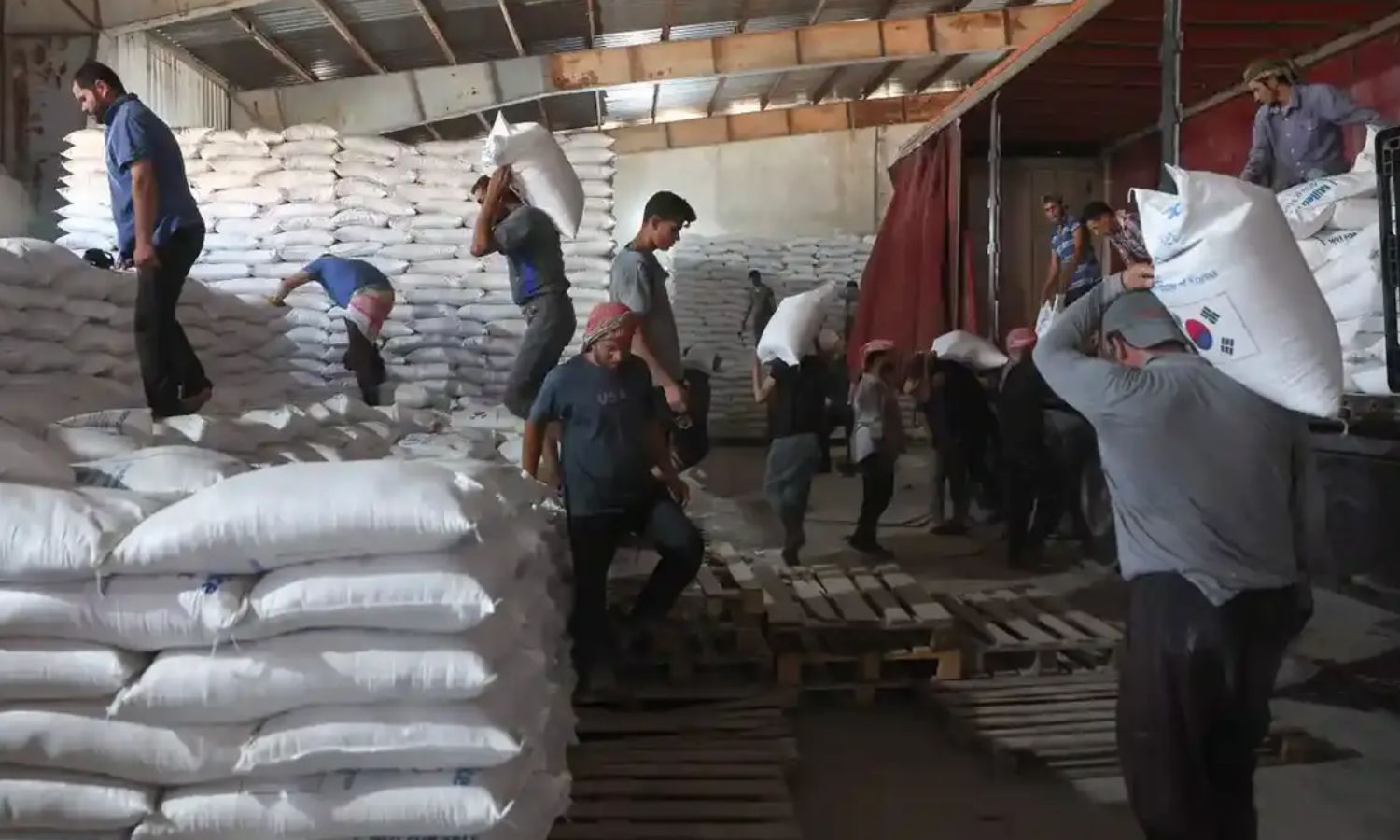
Workers unloading bags of aid in a warehouse near the Bab al-Hawa border crossing – July 10, 2023 (AFP)
|
The United States will continue to support the Syrian people, and we will remain committed to re-authorizing the cross-border mechanism. It is a moral and humanitarian duty, and the Syrian people are counting on us to accomplish this, so we will continue to work to achieve this. A source in the US State Department told Enab Baladi |
From the aid gate, Russia puts pressure on the West
Moscow did not get ahead of the Security Council session scheduled to vote on the decision to extend the transit of aid through Bab al-Hawa crossing with opposing statements in an unprecedented manner during the past years, which made its position on the matter seem surprising, and it followed it later with a threat to stop the mechanism.
Russia’s representative to the United Nations said during the Security Council session, “Today we are witnessing again a new chapter in the play of Western countries called the cross-border mechanism for providing humanitarian aid to Syria,” considering that the features of this “play” are provoking Russia to push it to use the veto, as he put it.
The delegate commented on the Swiss-Brazilian project that it “pushed Western interests and ignored legitimate requests from Syria, and the result was a project that does not enable us to correct the mechanism,” adding that “Blessing the mechanism allows terrorists to enter and prevents the arrival of humanitarian aid, and it is a mechanism that enables Western countries to fund relief and early recovery projects in areas not controlled by the Syrian government while distancing the Syrian government under the burden of limited unilateral measures. This is a violation of Syria’s territory and sovereignty,” he said.
The delegate concluded his speech by saying that if the Russian project does not receive any support from the members of the Security Council, “we will simply close this mechanism.”
Russia’s insistence on passing its project only, and limiting the aid entry mechanism through the Bab al-Hawa crossing to a timetable of only six months, raises questions about the outcome of its position amid expressing its direct willingness to stop the mechanism in case its project is not approved, which is what actually happened.
Mahmoud al-Hamza, a political analyst specializing in Russian affairs, told Enab Baladi that Moscow proposes the minimum of opening one crossing for a period of six months only because it basically wants to cancel the mechanism, but it finds it difficult to confront the Western project, amid the region’s need in northwestern Syria for international aid.
Al-Hamza added that the aid entry mechanism is supposed to reach a solution without being complicated, pointing out that Russia, behind its insistence on its project, is trying to achieve gains from the West, which also wants to make gains in this context.
However, the aid issue must be resolved for many considerations, including international or regional political ones and others related to the internal Syrian situation.
Richard Gowan, UN director at the International Crisis Group, said, “The Russians had hinted they would show some flexibility on this year’s cross-border negotiations, but that might have been a ruse,” according to Al-Monitor website.
“The general feeling was that this renewal would be bumpy but all right in the end,” Gowan said. “This is not the endgame Western countries wanted,” he added.
Millions are affected
Prior to the Security Council session that was scheduled to extend the UN mandate, Syrian and international humanitarian and relief organizations reiterated their calls for the extension of Security Council Resolution No. 2672 for cross-border aid entry into northern Syria.
The Syria Civil Defense agency said on July 8 that the UN mandate is about to expire, at a time when humanitarian needs are escalating after the Feb.6 devastating earthquake, and the necessities of life are absent, especially in the displacement camps, after a 12-year war.
In turn, Doctors Without Borders (MSF) said that it is necessary to ensure the strengthening of humanitarian access to the population in northwestern Syria by all available means and crossing points and to expand its scope and ensure its sustainability in order to ensure the uninterrupted delivery of life-saving aid.
According to the latest report issued by the United Nations Office for the Coordination of Humanitarian Affairs (OCHA), the population in northwestern Syria is 4.5 million, and the number of internally displaced people in the region is 2.9 million, of whom 1.9 million live in camps.
The number of people in need of assistance in the region is about 4.1 million people, while 3.3 million people suffer from food insecurity.
Munir al-Mustafa, deputy director of the Syria Civil Defense, said that there is absolutely no alternative to the mechanism for entering aid across the borders, as ensuring continuous and unhindered access for life-saving humanitarian aid through all possible crossings is extremely important.
“It should not be negotiable or subject to the authorization of the United Nations Security Council, especially in light of the dire humanitarian needs today after 12 years of war and the devastating earthquake catastrophe exacerbated the needs,” he stressed.
In an interview with Enab Baladi, he added that the Assad regime’s exploitation of aid during the devastating earthquake, when northwestern Syria was suffering under the weight of the catastrophe, gives a clear perception that what it is doing is a political maneuver to obtain legitimacy.
Al-Mustafa pointed out the need to be careful about the politicization of this aid and linking it to the approval of the Syrian regime or to accept that humanitarian assistance is limited to cross-lines.
He also noted that historically, the aid flowing through Damascus has been used as a weapon to punish the population, is politicized and deliberately disrupted by the Syrian regime, and is not on a sufficient scale to replace cross-border humanitarian aid.
Sherine Tadros, deputy director of the Advocacy Program and Amnesty International’s representative to the United Nations, said that the organization calls on the United Nations to continue delivering cross-border aid through all available border crossings, regardless of the Syrian government’s approval or not.
She noted that the lives of more than four million people are at stake, and international law is clear that their rights must be of the highest priority.
|
The fate of millions should not depend on authorization from the United Nations Security Council or the approval of the Syrian government. Toxic political gamesmanship has prevented aid from reaching those whose lives depend on it. Whether the permit expires or not, stopping the flow of aid across borders at such a critical time would amount to abandoning desperate people and denying them their basic human rights. Sherine Tadros – Representative of Amnesty International to the United Nations |
The Syrian Response Coordination Group (SRCG) Team said in early July that stopping the entry of aid into northwestern Syria will deprive more than 2.6 million people of food aid and more than 2.8 million people of access to clean or potable water, in addition to depriving more than 1.1 million people of getting bread on a daily basis, and other deficits that may hit the region.
if you think the article contain wrong information or you have additional details Send Correction
النسخة العربية من المقال
-
Follow us :
Most viewed
- Al-Sharaa and Abdi reach agreement on merger of SDF into Syrian state
- Turkey confirms continuation of its operations in northeastern Syria
- Governor of As-Suwayda signs understanding agreement with al-Hijri: Key details unveiled
- Syrian Defense Ministry appoints "Abu Amsha" as Hama Brigade commander
- No financial flows to Syria despite partial lifting of sanctions












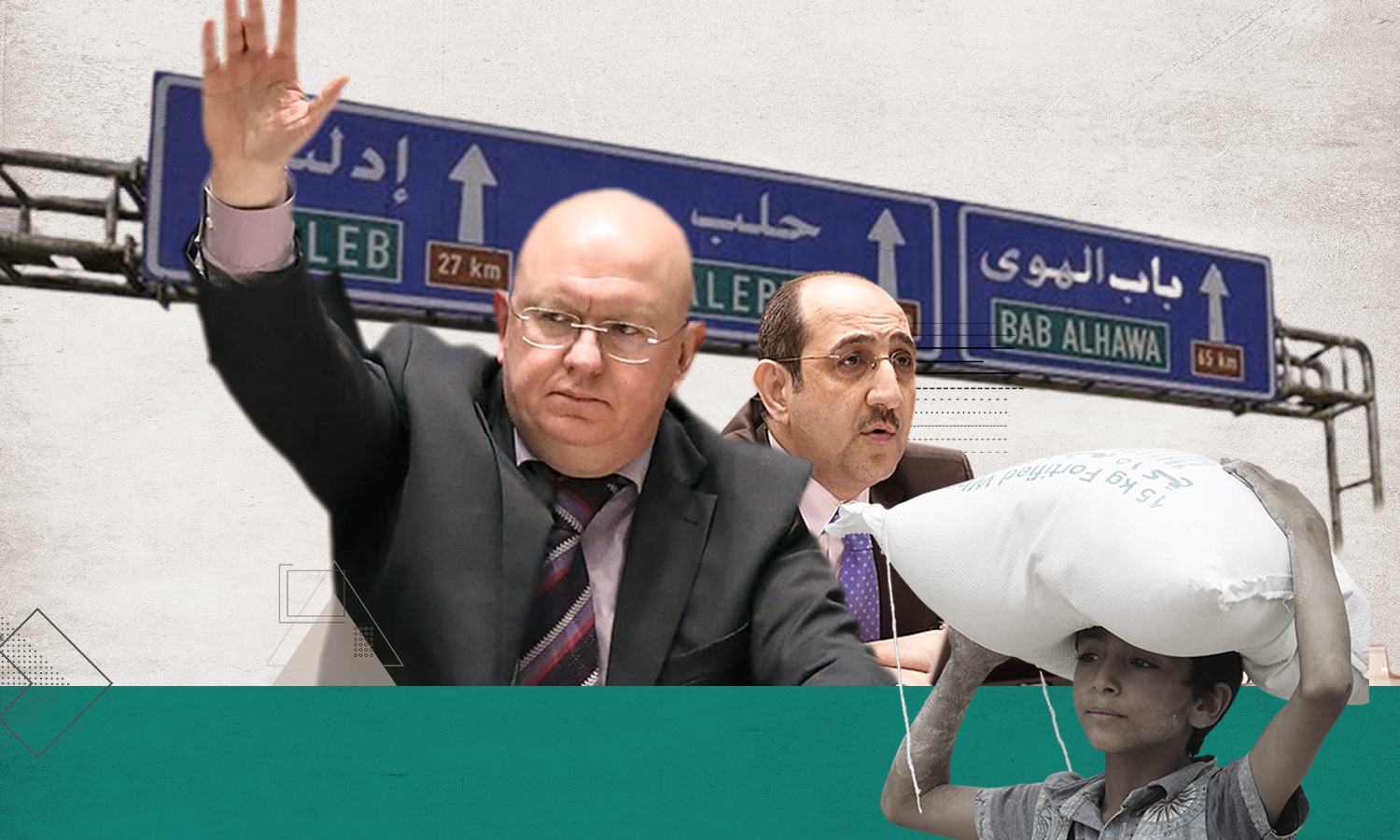
 Vasily Nebenzya, Russia’s Permanent Representative to the United Nations and the Permanent Representative of the Syrian regime to the UN, Bassam Sabbagh (Edited by Enab Baladi)
Vasily Nebenzya, Russia’s Permanent Representative to the United Nations and the Permanent Representative of the Syrian regime to the UN, Bassam Sabbagh (Edited by Enab Baladi)





 A
A
A
A
A
A

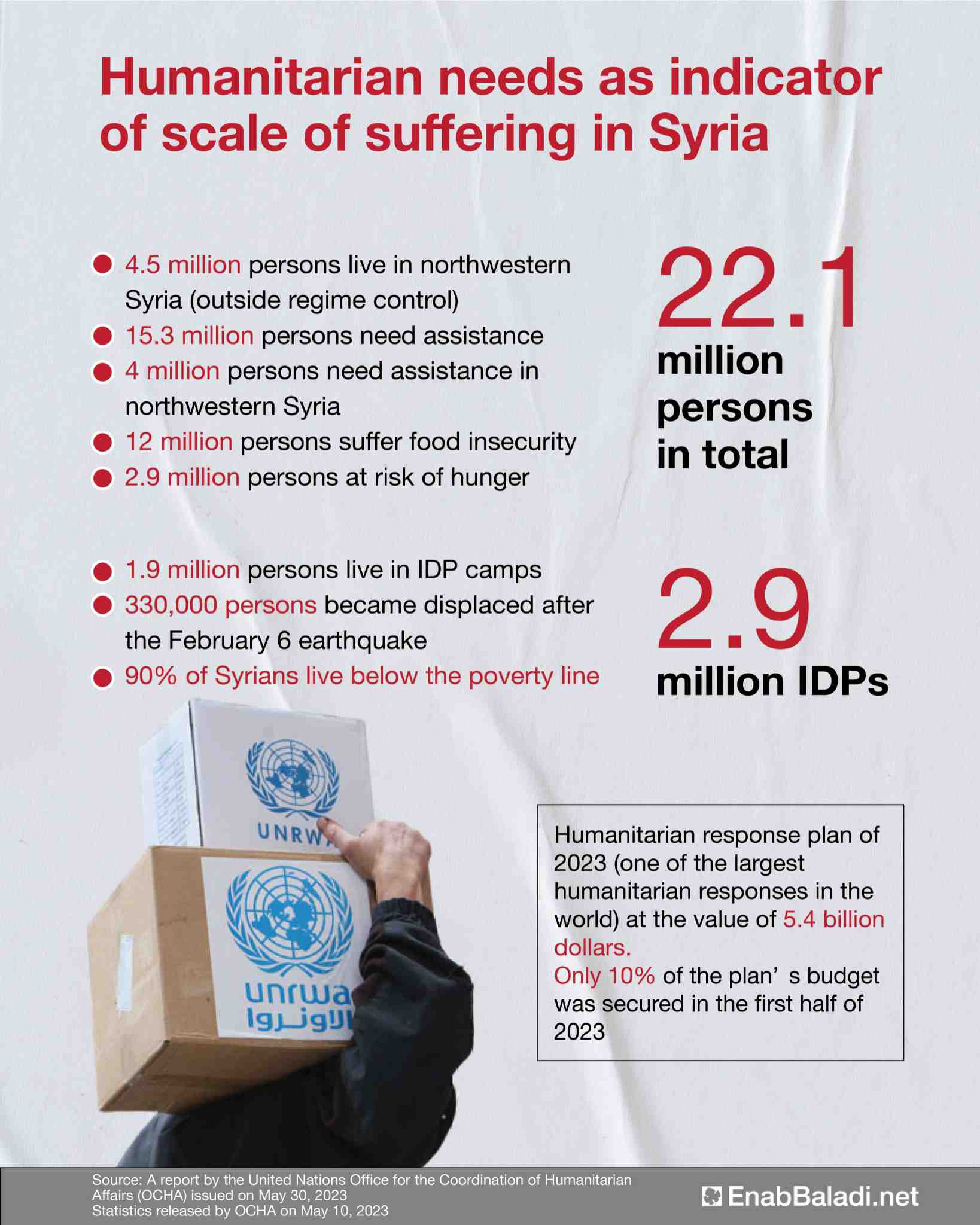
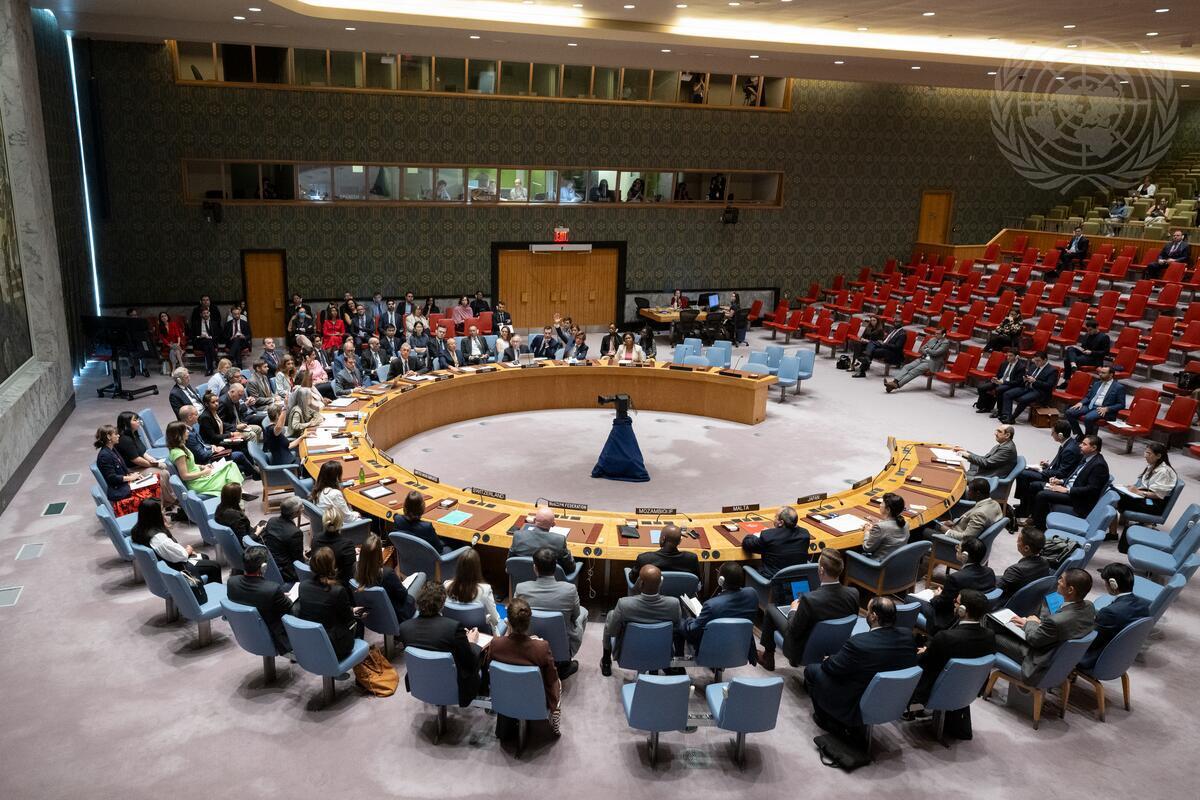
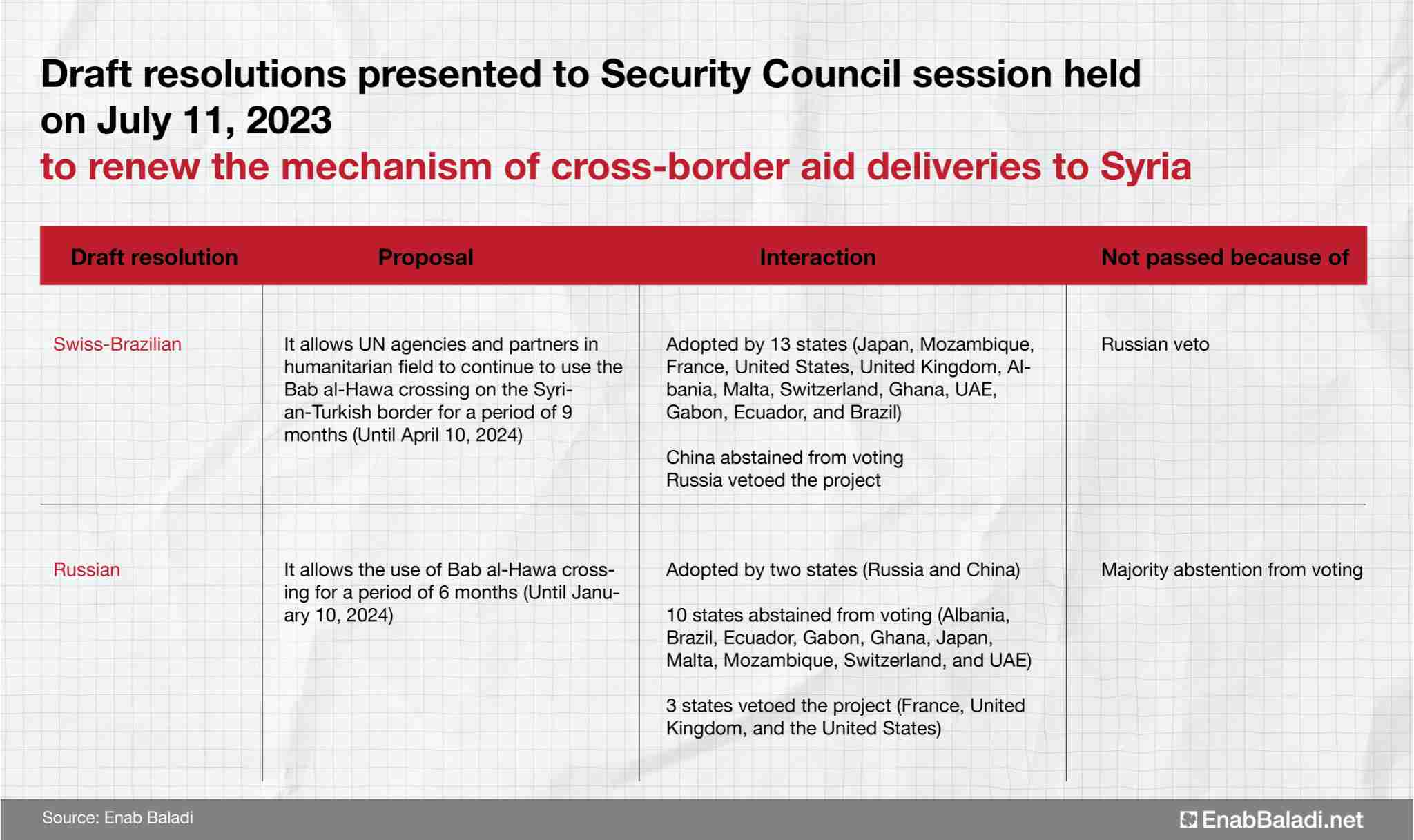


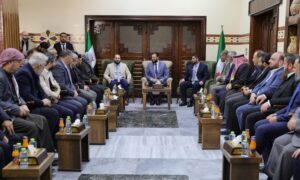
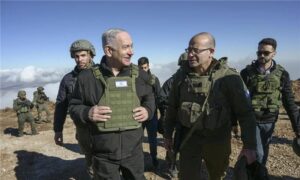

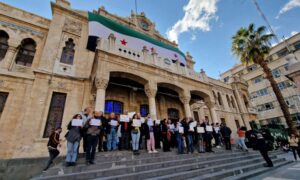
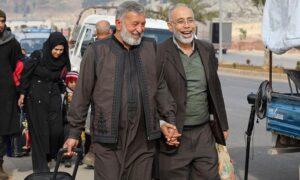
 More In-Depth
More In-Depth